SUMMARY
This is AI generated summarization, which may have errors. For context, always refer to the full article.

MANILA, Philippines – In a room of senators allied with her, Vice President Sara Duterte faced the Senate committee on finance on Monday, September 4, as she defended the Office of the Vice President (OVP)’s request of P2.3 billion for 2024, and the Department of Education’s (DepEd) P758.6 billion.
She provided little to no answers to the questions, and merely passed them on to her staff for them to respond.
While the budget deliberations for the OVP this time lasted for about an hour and a half, it was cut short when Senator Ramon “Bong” Revilla Jr. moved to end the budget hearing as a “courtesy” to the second highest official of the country. Meanwhile, the DepEd’s budget hearing ran for around four hours, still much shorter than in the previous years of about eight to 10 hours, when its secretary wasn’t an elected official.
The 2024 OVP and DepEd budget will be up for discussion in plenary – a step closer to getting approved.
Last year’s OVP budget hearing was completed in less than an hour, much shorter than this year. The swift scrutiny of proposals by the Office of the President and OVP during budget deliberations has been repeatedly justified as part of congressional courtesy for both executive offices.
But Duterte’s request for a hefty budget was controversial as it involved P500 million in confidential and intelligence funds (CIF) for the OVP and P150 million CIF for the DepEd. She was able to get this approved last year in a Congress dominated by her allies – despite public criticisms.
But it seems that the Vice President’s preference for confidential funds hasn’t gone unnoticed. A Commission on Audit Report (COA) showed the OVP spent P125 million in confidential funds for 2022. But curiously, in the 2022 OVP budget prepared by the office of then-vice president Leni Robredo there was no provision for a line item on confidential funds.
Violation of the Constitution?
How then was it possible for the OVP under Duterte to spend P125 million in CIF that did not exist in a pre-crafted 2022 Robredo budget?
At the Senate budget hearing on Monday, Duterte said she requested the Office of the President (OP) for a transfer of funds. “We requested it to the Office of the President, and was granted through [the] Department of Budget and Management. I think [the] DBM can better answer the transfer of funds. Nevertheless, we complied with the reportorial requirements on the use of funds as confidential funds.”
This was confirmed by Malacañang on Tuesday, September 5. The Executive Secretary said the OP transferred the following amount to the OVP taken from its contingency fund:
- Financial Assistance/Subsidy – P96.424 million
- Confidential Funds (for newly-created satellite offices) – P125 million
It was ACT Teachers Representative France Castro who first criticized the Vice President over the P125 million OVP confidential funds. Castro, who has been a staunch critic of Duterte, said that President Ferdinand Marcos Jr. couldn’t just give Duterte contingency funds to be used as CIF because such was not expressly provided for in the budget allocation of the 2022 General Appropriations Act (GAA).
Under the 2022 GAA, the OVP was given a P702-million allocation – with no CIF whatsoever.
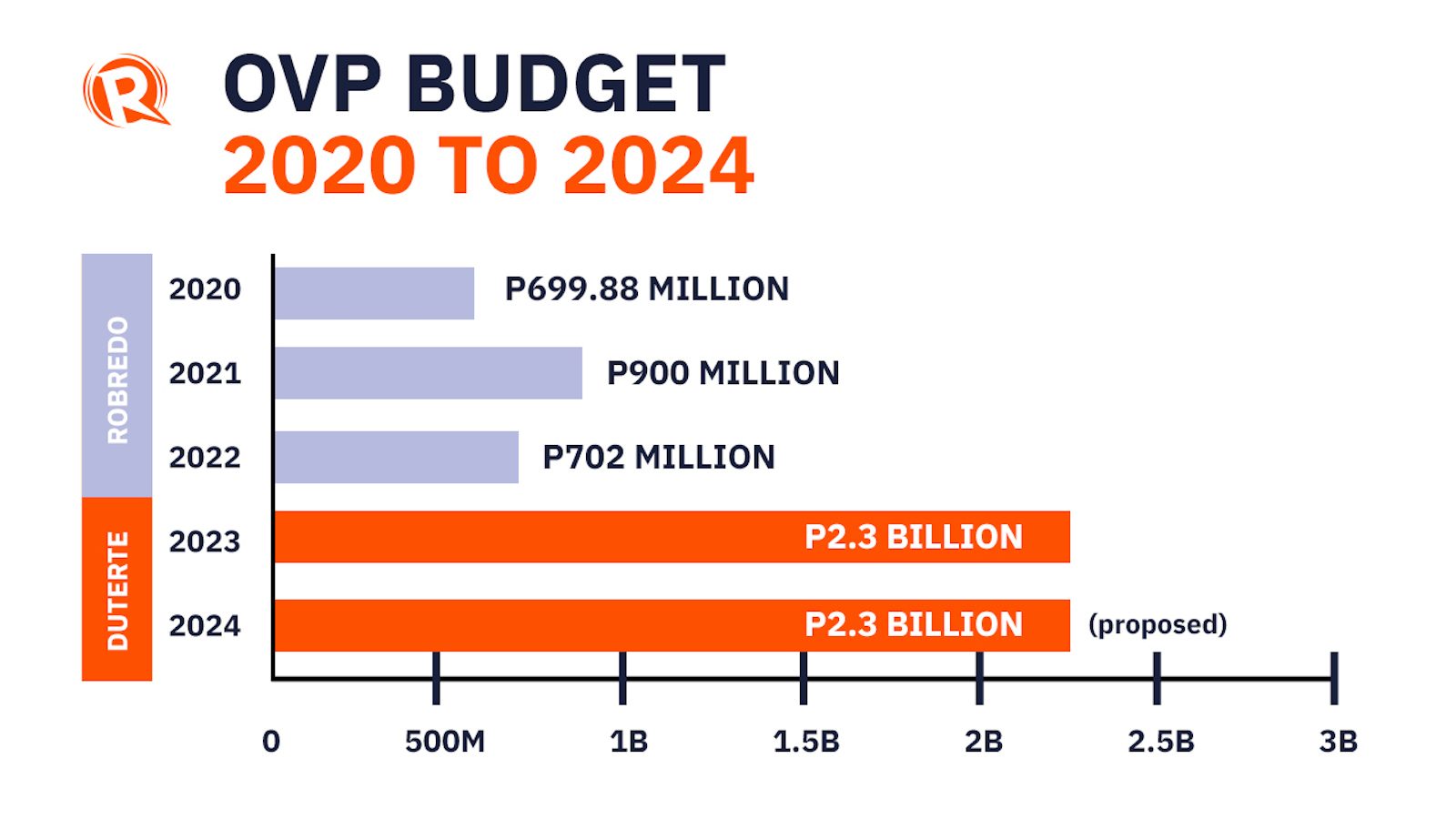
A budget expert told Rappler that the transfer of funds from the OP to the OVP was a violation of the Constitution. He said only Congress has the power to appropriate funds, as mandated by law.
“The use of public funds is authorized by an appropriation approved by law. The funds cannot be transferred because it is based on an appropriation allocated to an agency. An appropriation cannot just be transferred by an agency (here, the OP) to another agency (here, the OVP). The power to appropriate public funds is lodged in Congress as its exclusive function,” he said.
However, he noted that the transfer of funds is allowed only under the following circumstances:
- augmentation
- deficient but existing item of appropriation of an agency
- savings from another agency within the same branch of government
- approved by the head of the branch
- as authorized by law (usually the GAA)
He noted that the request for a transfer of funds does not qualify under any of the circumstances listed above. “Was the confidential fund a deficient, but existing item of appropriation under the budget of the OVP that can be augmented by savings from the budget of the OP?” he asked rhetorically.
In a statement on Tuesday, former Senate president Franklin Drilon also said that the OP violated the Constitution. “It is clear that the transfer runs counter to the basic principles of budgeting and governance enshrined within Article VI, Section 25 (5), of the Constitution,” Drilon said.
That part of the Constitution states, “No law shall be passed authorizing any transfer of appropriations; however, the President, the President of the Senate, the Speaker of the House of Representatives, the Chief Justice of the Supreme Court, and the heads of Constitutional Commissions may, by law, be authorized to augment any item in the general appropriations law for their respective offices from savings in other items of their respective appropriations.”
Drilon, who also served as justice secretary during the administration of the late president Corazon Aquino, said the transfer raised “constitutional questions and violates the Supreme Court ruling in the case of Araullo v Aquino.”
The former Senate president said the transfer of funds could only be allowed through a process called augmentation. This, according to Drilon, is allowed only for existing but deficient items of appropriation. Without existing items in the OVP’s budget for these, the OP should not have been able to augment anything.
‘Legal’
Malacañang, however, maintained that the transfer was “legal.” The Office of the Executive Secretary said that it was done in “pursuant to Special Provision No. 1 under FY 2022 Contingent Fund. Under Special Provision No. 1, the President is authorized to approve releases to cover funding requirements of new or urgent activities of NGAs (national government agencies), among others, that need to be implemented during the year.”
“VP Sara, who was newly elected then, needed funds for her new programs for the remaining period of 2022. The President supported this initiative and released the funds, with the favorable recommendation of DBM,” it added.
Duterte enumerated the following as falling under the OVP: Libreng Sakay program, Entrepreneurship program, Peace-building in communities, Pagbabago campaign, PagbaBAGo: A Million Learners and Trees, Pansarap program, Disaster Operations Center.
The budget expert said: “Whether you are entitled to the CIF or not is not the issue. The issue is whether in the transfer of funds from the OP’s contingency fund to the OVP as confidential funds, the applicable constitutional, legal, or department rules were followed.”
Rappler reached out to the budget department for comment, but it refused to answer queries regarding the matter. Budget Undersecretary Goddes Libiran kept on saying the matter would be discussed during the budget hearings, but the question was never raised nor answered there.
‘Dangerous precedent’
The CIF fiasco involving the Vice President and the use of CIF sets a dangerous precedent. Without the proper safeguards, this means that any head of agency can just abuse requests for inter-agency budget transfers, especially those closely allied with the President.
“The reason the framers of our Constitution elevated the prohibition on transfer of appropriation as a constitutional provision is to preserve and strengthen the separation and independence of the branches of government, the very foundation of the check and balance system of our presidential democracy,” the budget expert told Rappler.
He said that tolerating the violation of this constitutional provision will allow one branch, in this case, the executive, to usurp the powers of another branch, in this case, the legislature, and become more powerful than the other two branches.
“This can pave the way for the emergence of an authoritarian regime and the development of an illiberal democracy, as is the case now in Hungary, Turkey, Thailand, Singapore and the Philippines during the time of then-president Duterte,” he added.
At the Senate, only the minority bloc, Senate Minority Leader Aquilino “Koko” Pimentel III and Deputy Senate Minority Leader Risa Hontiveros, quizzed Duterte about her request for a hefty CIF.
‘President-in-waiting’
Political analyst and Ateneo de Manila University professor Arjan Aguirre said it is unlikely that Duterte will face scrutiny in any controversy or issue she gets into because of her power and popularity.
“We can expect here that Vice President Duterte won’t face any resistance or difficulty in pushing for her agenda in the House and Senate since all of them want this coalition to be stable in the near future,” Aguirre said.
Aguirre explained that in a “working coalition,” a major partner – such as Sara Duterte – tends to easily mobilize support among allies since the coalition has shared objectives and mutual benefits, especially when they need to lobby for legislation.
“Lawmakers don’t want to antagonize the Vice President because of the perception that she is a potential presidential candidate in 2028. It’s also logical for them to please her since she is also second in command. She is the president-in-waiting. Anytime she can be the president,” he added.
Pollster Social Weather Stations conducted a survey in June and showed that Duterte was the “best leader to succeed President Ferdinand Marcos Jr. in 2028.”
In the 2022 elections, Duterte got 32,208,417 votes, or 61.53% of the total votes cast in the vice presidential race. She got more votes than Marcos who got 31,629,783. – Rappler.com
1 comment
How does this make you feel?
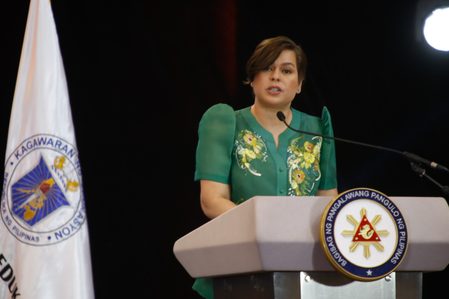
![[In This Economy] Why Marcos is getting high on unprogrammed funds](https://www.rappler.com/tachyon/2024/07/TL-marcos-program-funds-july-19-2024.jpg?resize=257%2C257&crop=265px%2C0px%2C720px%2C720px)
![[In This Economy] Is the Marcos government unlawfully dipping into PhilHealth funds?](https://www.rappler.com/tachyon/2024/07/marcos-government-philhealth-funds-july-12-2024.jpg?resize=257%2C257&crop=425px%2C0px%2C1080px%2C1080px)


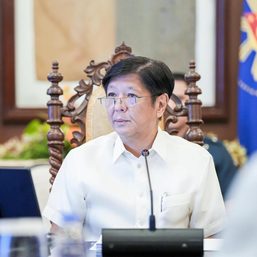


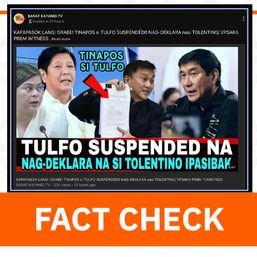
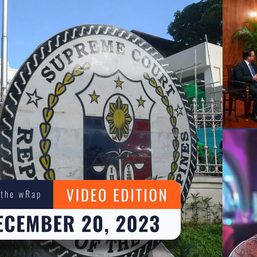


![[OPINION] Does VP Sara Duterte have a game plan?](https://www.rappler.com/tachyon/2024/06/sara-duterte-game-plan-june-25-2024.jpg?resize=257%2C257&crop_strategy=attention)
![[Newsstand] What’s next for VP Sara: Go Macapagal or go Arroyo?](https://www.rappler.com/tachyon/2024/06/tl-vp-sara-duterte-go-macapagal-go-arroyo-1.jpg?resize=257%2C257&crop=412px%2C0px%2C1080px%2C1080px)

This is a test of the Rule of Law in this Country. The end result of this
issue is worth watching. It will determine what is the real nature of the Marcos Jr. Government (including that of the future Sara Duterte’s Government) – whether it is a Government of Law or a Government of Men. (Note: Perhaps when Sara Duterte will become President, will the last phrase be changed to “… Government of Women”?)